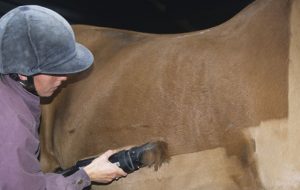
With the nights drawing in, there is no denying that autumn is here. Make sure you and your horse are ready for the colder weather with our seasonal horsecare guide.
1. Hardcore
Putting hardcore down in gateways before the winter will help these areas stay compact, and prevent them from becoming too muddy and slippery.
2. Winter rugs
If you didn’t get your winter rugs cleaned and repaired in the spring, now is the time to do it. Or if you need new rugs, it’s time to go shopping!
3. Clippers
Get your clippers serviced and the blades sharpened by a specialist so you are ready to tackle those winter woolies. If you want to learn how to clip like the experts, check out our clipping masterclass video.
4. Worming
Autumn is the ideal time to test and treat horses for tapeworm, while vets recommend all horses should be wormed for encysted small redworm during November/December. So now is the time to get organised and order your worming supplies, checking that the active ingredients are the right ones for the the types of worms you are targetting.
5. Bedding
Choose bedding wisely if your horse is to be stabled in the coming colder months. If your horse suffers from respiratory problems consider using a dust-free bedding combined with rubber matting. You may find you can save yourself money by buying in bulk.
6. Dietary changes
If your horse is overweight the next few months is the ideal time to slim him down, or if he is inclined to lose weight now is the time to start thinking about his autumn/winter feeding regime before any weight loss occurs. Remember that good quality forage is important before turning to cereal feeds. Feeding oil will also help maintain condition.
7. Mud fever
Mud fever can start in autumn if conditions are wet and muddy. Avoid long periods of exposure to these conditions, as bacteria from the soil can enter the horse’s body through damaged skin or cuts.
8. Vaccinations
Check if your horse’s vaccinations are due. It’s easy to allow them to slip and costly if you have to restart the full course. Consult your vet if you are unsure what vaccinations your horse needs.
9. Teeth
Get your vet or equine dental technician to check your horse’s teeth before winter, to ensure they are able to make the most of their feed. This is particularly important for youngsters and older horses.
10. Grass
Laminitis is most commonly associated with spring grass, but cool nights lead to an increased accumulation of sugars in grass. If you own a laminitis-prone horse consider whether you need to restrict their grass intake.
11. Fly gear
Clean your fly sheets and masks and store them ready for use in the spring. Bring all your fly sprays, shampoos and other liquids indoors to prevent freezing and thawing, which may make them less effective.
Continued below…

9 reasons riders love (and hate) autumn
Oh, autumn, here’s nine things we love about

Why autumn hunting is awesome, plus 8 other useful things you need to know
It might be a month until the opening

Give the gift of Horse & Hound and save 35%
If you want to keep up with the
12. ‘Winterise’ your yard
After the ground has frozen you won’t be able to sink new fence posts, so make sure they are all secure now. Check gutters and downpipes are in good condition and clear of debris. Insulate your pipes and unhook hoses when not in use, especially during the night when it may drop below freezing.
13. Cooling
If your horse works up a sweat while being ridden, have a wool or fleece cooler to hand to throw over him while he’s cooling down to prevent him from becoming chilled.
14. Shooting
If you live in an area where deer stalking or shooting may occur, it is best to avoid riding out at peak times. Outfit yourself and your horse in bright colours or talk to your fellow riders to make sure you can be seen and heard.
Horse & Hound magazine, out every Thursday, is packed with all the latest news and reports, as well as interviews, specials, nostalgia, vet and training advice. Find how you can enjoy the magazine delivered to your door every week, plus options to upgrade to access our H&H Plus online service which brings you breaking news as it happens as well as other benefits.

























